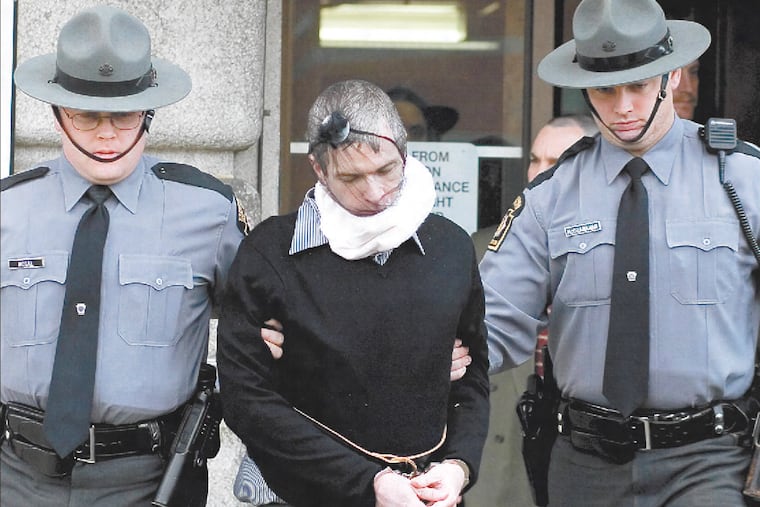When nurses kill: N.J. has tried to prevent these deaths. Pa. should do more. | Expert Opinion
In rare instances, health-care professionals — the people we trust with our lives — betray us. New Jersey has taken a key step to prevent this, and Pennsylvania must follow.

In late May, the Pennsylvania attorney general announced that her office had arrested and charged a registered nurse for the murder of two patients and the attempted murder of another at a skilled nursing facility in Western Pennsylvania.
In early November, additional charges against Heather Pressdee were filed. She now faces four counts of first-degree murder, 17 counts of attempted murder, and 19 counts of neglect of a care-dependent person at multiple health-care facilities beginning in 2020.
Pressdee has admitted to giving nearly two dozen patients large doses of insulin, which can kill by causing blood sugar levels to fall. According to state prosecutors, she talked openly about how her elderly patients “just needed to die.”
Reading about this case in the news, I got flashbacks to a similar story from 20 years ago.
In early July 2003, as New Jersey’s state epidemiologist in the Department of Health and Senior Services, I was contacted by the executive director of the state’s poison control center about some suspicious deaths at Somerset Medical Center.
Over the next several months, Pennsylvania and New Jersey state regulatory and law enforcement authorities focused their investigation on a registered nurse, Charles Cullen, working at Somerset. He was arrested in December 2003 and admitted to killing dozens of patients at multiple institutions in New Jersey and Pennsylvania.
In all cases, patients died from overdoses of insulin or other drugs such as digoxin, a heart medication that can also be fatal in high doses.
Since his conviction, Cullen has been serving consecutive life sentences in a New Jersey prison.
There is something especially troubling about instances where health-care professionals — the people we trust with our lives, and the lives of people we love when ill and most vulnerable — betray us.
In perhaps the most troubling aspect of these tragedies, both Cullen and Pressdee were allowed to hop from one facility to another, evading definitive investigation of potential malfeasance. Cullen worked at five other hospitals in New Jersey and Pennsylvania and was asked to leave three, in some cases over his handling of lethal medications. In Pressdee’s case, staff at her previous facilities had also raised concerns about her, specifically around her dosing of patients with insulin.
How did this happen? Why were the mistakes that happened with Cullen repeated with Pressdee?
In 2005, the New Jersey Legislature passed the Health Care Professional Responsibility and Reporting Enhancement Act, termed the “Cullen Law,” which required health-care entities licensed in the state to report employee professional misconduct, incompetence, or impairment to the Division of Consumer Affairs. This division licenses all health-care professionals in New Jersey.
In addition, employers who are hiring health-care workers must ask their previous employers about any history of disciplinary action. Health-care entities must respond within eight days of receiving such requests and are subject to financial penalties for failing to comply with recording and reporting requirements.
But Pressdee wasn’t working in New Jersey. She was in Pennsylvania.
After the Cullen murders, Pennsylvania passed a law in 2005 providing immunity to employers who provide information on current or former employees to prospective employers. This law is not specific to health care, though, and does not require disclosure of poor performance or suspicious behavior.
Pennsylvania also has laws and regulations requiring health-care facilities to report safety concerns to the Pennsylvania Patient Safety Authority, or suspicions of inappropriate behavior of licensed professionals to the appropriate licensing board.
But I can find no Pennsylvania law requiring health-care facility-to-facility disclosure, similar to the Cullen Law in New Jersey — even though Cullen murdered at least seven patients in Pennsylvania a quarter century ago.
Why the decades-long delay?
Why the decades-long delay?
The case against Pressdee should be a galvanizing moment for Pennsylvania legislators, illustrating the risks of failing to pass laws and adopt regulations that prevent homicides by health professionals targeting helpless patients.
When we or someone we love is hospitalized or becomes a resident of a skilled nursing facility, there are many things to worry about: treatment/testing errors, falls, deadly infections, and other life-threatening concerns.
Thankfully, the health-care enterprise takes these risks seriously and has done much to reduce the chances they will happen, through regulations and adoption of best practices and policies. But as long as Pennsylvania has no law similar to New Jersey’s Cullen Law, patients will remain vulnerable to deliberate criminal acts by health professionals.
Our representatives must take legislative action to make the homicide of patients by health-care workers a “never event.” They should pass a law similar to the Cullen Law.
Eddy Bresnitz is a physician and former deputy commissioner for public health services in the New Jersey Department of Health, where he was also the state’s chief epidemiologist. During his tenure in the department, he also served for a time as its representative to the state Board of Medical Examiners. dreddybres@gmail.com